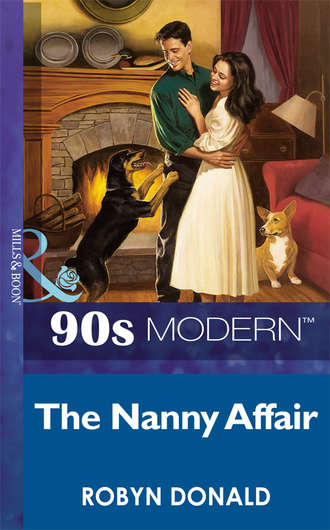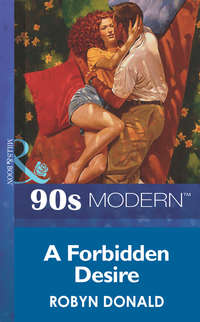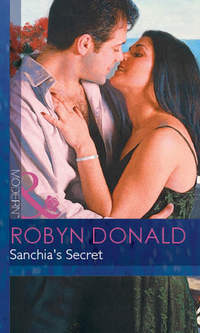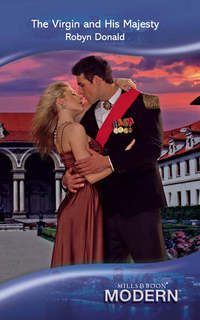
Полная версия
The Nanny Affair
She and Kane had nothing in common. He was cosmopolitan, with a sophistication that was so essential a part of him he probably didn’t even realise he possessed it. Not for him the fake worldliness, the desperate effort to be cool of so many younger men. And he was almost engaged, whatever that meant.
Watching the broad shoulders flex as he hoisted the grocery bags from the boot, Emma thought that he’d know exactly how to make a woman so aware of him she’d begin to think of all sorts of disturbing things, like how good he’d be as a lover.
A disconcerting wrench of sensation in her stomach turned to heat. Fortunately he was so much older than her—ten years or so, she guessed—that he probably did think of her as barely grown up. He was just being a considerate neighbour; she was the one with the problem.
‘Here, I’ll take a bag,’ she said, when it was obvious he intended to carry all three in.
‘They’re not heavy.’
Setting her jaw, she followed him up the two steps to the brick porch at the back of the house. She didn’t realise that he’d stood back to let her go first until she cannoned into him.
‘Ouff,’ she muttered, leaping back with a memory of muscles like iron and a faint, sexy scent, not soap or shaving lotion, just Kane Talbot.
‘Sorry,’ he said calmly.
She gave him a brief glance, and muttered as she went in, ‘I didn’t see you.’
Leading the way into the kitchen, she took a couple of deep breaths to centre herself. ‘Just put them on the bench, please,’ she said, pointing to the smooth grey granite.
He did that, then glanced at her with amusement glinting beneath black lashes as straight as his brows.
Emma looked past him and said softly, ‘Oh, look outside—on the maple branch. A tui!’
The iridescent bird ducked and bowed along the branch, head held low as he sang a soft, seductive song. At his throat a tuft of white feathers bobbed like a stock in a lace collar when he fluffed his wings and repeated the sinuous movements and his song. Against the glowing red stems of the maple tree he looked superb.
‘What’s he doing?’ Emma asked quietly.
‘He’s courting.’ Kane’s voice was unexpectedly abrupt. ‘He knows how splendidly those branches set off his colours; he’s parading, looking for a mate, promising that he’ll give her ecstasy and young ones and keep all their bellies filled.’
A note in his words dragged her gaze from the bird strutting his stuff outside. Kane’s face had hardened into indifference, but there was a twist to his lips that gave his comment a satirical inflection.
Tentatively she asked, ‘Would you like a cup of tea or coffee?’
‘No, thank you, I have to keep going,’ he said, the words so quick and cool they were a rebuff.
Brows pleated, Emma watched the big car go down the road and turn into his drive. He’d been reasonably friendly, and then suddenly, as though she’d insulted his mother, he’d withdrawn behind an impervious armour.
‘Perhaps he thought I was flirting with him,’ she told the dogs, who were eyeing the packets of pet mince with anticipatory interest. ‘Well, he was wrong. Men with dangerous eyes and tough faces and volatile moods do nothing for me at all. Even when they’re not virtually engaged to Australian women of impeccable family. Whoa, hold your horses; I’ll make your dog biscuits this afternoon. I want to do some weeding first while it’s fine.’
Once outside, Babe found a warm place on the brick terrace and went to sleep, while Lucky investigated a score of fascinating scents around the garden before settling close to her. As Emma tugged at weeds encouraged into growth by the warm touch of spring, she decided that her unexpected holiday had altered direction. Kane’s arrival on the scene had sent her stumbling blindly into perilous, intriguing, unknown territory.
She yanked out a large sowthistle, patted back into place the three pansies its roots had dislodged, and tried to persuade herself that the slow excitement that licked through her whenever she thought of the man next door was uncomplicated attraction, a pragmatic indication from her genes that she was old enough to reproduce and that for the survival of her offspring it would be wise to choose a tough man who was a good provider, with enough prestige to protect her from other men as well as the strength to beat off cave bears and sabretooth tigers.
Basic stuff, an inheritance from the primitive past, still powerful even though it was outdated at the end of the twentieth century.
‘And don’t forget,’ she reminded herself, ‘the almost-fiancée.’
After an hour of solid work she stood to admire a bed of pansies and tall bluebells unmarred by weeds. But as she scrubbed the dirt from her fingernails she admitted that her next door neighbour had been constantly on her mind, disturbing her usually serene thoughts and refusing to go away.
The telephone rang. She scrabbled to dry her hands on the towel and ran into the kitchen. ‘Yes?’ she asked breathlessly.
‘Were you outside?’
Divorced from the actual physical presence of the man, Kane Talbot’s voice made its own impression. Deep and level, with an intriguing rasp in the middle register, it brushed across her skin like velvet.
‘I was washing my hands,’ she said, trying to sound cheerful and bright and ordinary. ‘I’ve been weeding.’
‘I thought Mrs Firth had Fran Partridge to help in the garden.’
‘She does, but Ms Partridge went away this morning, and anyway, I like weeding.’ Fran Partridge was a single mother and the probable source, Emma had decided on meeting her, of Mrs Firth’s information about the locals.
How did she know Kane was frowning when he said, ‘Where’s Fran gone?’
A subtle undernote in his voice betrayed his expression. Before she’d realised it was none of his business, Emma told him, ‘It’s the school holidays and she’s on a trip somewhere with her son.’
‘Of course. I’d forgotten.’ He was silent, possibly thinking of Davy Partridge, who lived at the end of the road and rode his bike up and down on fine days, singing at the top of his voice. ‘It’s unusual for someone of your age to be interested in gardening.’
Emma bristled. ‘Is it?’
‘Most twenty-year-olds prefer to be out and raving.’ An ambiguous note of—amusement?—echoed through his words.
Emma’s teeth clenched for a second on her bottom lip. ‘Well, perhaps because I’m twenty-three instead of twenty, I enjoy gardening.’
‘Ah, a mature woman.’
Definitely mockery. Her chin lifted. Very clearly she said, ‘That, I suppose, is a matter of opinion. To someone of your age I might appear quite green and raw.’
‘Sweet, actually,’ he said odiously. ‘Eleven years is enough to make us different generations. Do you want me to ring Mrs Firth and tell her what the problem with the car is?’
Didn’t he trust her to be able to dial a number in Canada? Or did he think she was incapable of understanding the inner workings of an engine? Well, Emma thought, I’ve got news for you, Mr Talbot, sir. Lords of the manor have had their day; nowadays the peasants are more than capable of running their own lives.
Calmly she said, ‘That’s very kind, but it’ll be all right. I’m sure she has some idea of how the car works and the terminology won’t throw her. Or me,’ she added dulcetly.
There was a moment’s pause until he said in an amused voice, ‘That’s put me well and truly into my place.’
‘I—’
He cut in, ‘One thing I didn’t say before—if you need anything, let me know. We pull together in the country; it makes life easier for all of us. Goodbye.’ And he hung up.
‘And goodbye to you, sir, Mr Talbot,’ Emma said, crashing the receiver down. Lucky’s tail swept the floor.
Laughing a little to blunt the raw intensity of her feelings, she said, ‘Takes a dominant male to know one! Kane Talbot might be used to running everyone’s lives around here but he’s not going to run ours. We’d better go out and do some work together, Lucky. By the time your mistress comes back I’d like to have you able to stare at a sheep without wanting to chase it, which means you need to practise those commands. And, speaking of Mrs Firth, I’d better ring her right now and see what she wants done with her car.’
Next morning the sun was shining, and although the wind from the south was cold it had polished the sky into the radiant silvery blue that spring claims as its own. Yawning, Emma drew back the curtains and scanned the green, lovely contours of hill and valley.
Mrs Firth had given her permission to order a new clutch plate for the Volvo, so the part should be in Parahai by now. Thinking of that telephone call, Emma smiled. She’d had to field a couple of enquiries about Kane Talbot.
‘A very sexy man, isn’t he?’ the older woman asked slyly.
‘If you like them rough-edged and masterful,’ Emma parried.
‘Ah, I’ve seen him in evening clothes—no sign of rough edges then! You young things might like your idols to be pretty, but as you get older you appreciate the value of strength and power and discipline. He has a charming mother too.’
‘It doesn’t seem possible,’ Emma said delicately.
‘I’d like to see you both in action.’ Mrs Firth laughed. ‘I must go, Emma. Thank you so much for helping me in my hour of need. I’ll never forget it, and neither will Philippa.’
Philippa was her daughter, five years older than Emma, and as Emma had already asked after her she knew that her pregnancy was not being an easy one.
‘I had the free time,’ Emma said cheerfully, ‘and it’s no hardship to spend it in a place like this, I promise you! Northland in the spring is glorious.’
Halfway through the morning, while she was drinking coffee out on the terrace, she said sternly, ‘Sit!’ to Lucky, and waited for him to decide not to race across the lawn and bark fearsomely at the car pulling into the gateway. He obeyed, but he did bark.
Tamping down a flicker of excitement, Emma ordered, ‘Stay.’
Whining, he obeyed, and she left him to walk across the green damp lawn.
But it was not the car of yesterday, nor the Land Rover, and the driver, although tall, was nothing like the man who had managed to make himself so at home in her mind that she knew the exact shade of his eyes: a mixture of gold and bronze and flickering tawny fire that somehow chilled his gaze instead of heating it.
The woman leaning on the gate smiled at her, and as Emma was telling herself sturdily that she wasn’t disappointed she recognised the smile.
‘Hello,’ Kane Talbot’s mother said, ‘I’m Felicity Talbot, and you are Emma Saunders, and over there, looking desperate, is L-u-c-k-y, whose name I will not say in case it persuades him to disobey you and come across.’
How could Kane Talbot have such a laughing, lovely mother? Emma shook the hand offered to her and agreed, ‘It would indeed, and I shouldn’t push him too far. Do you like dogs?’
‘I love animals.’
So Emma said, ‘Good boy, Lucky. Here.’
Even he fell for that charm. After hurtling across to the gate, he smelt Mrs Talbot’s extended hand and gave her a swift swipe with his tongue before settling back on his haunches and beaming at her.
‘What a darling,’ she cooed.
‘Your son didn’t think so when he drove past as Lucky was chasing his sheep,’ Emma said stringently.
Dark eyes widened. ‘Goodness, it’s a wonder he didn’t shoot him then and there. Kane doesn’t usually hand out second chances.’
It figured. ‘I don’t suppose he had a gun with him, so Lucky was—well, lucky. And he came back when I called him,’ Emma explained. ‘Kane was angry, but I promised most faithfully not to let the dog off a leash again whenever we went near sheep.’
‘I should hope not! He looks as though he’s biddable.’
‘He’s very teachable.’ Emma turned as Babe woke up and realised they’d been joined by a stranger. Barking, she hobbled down from the terrace and sniffed her way across the lawn.
Stooping to let her smell her fingers, Kane’s mother asked, ‘Is she blind?’
‘Not quite, but her eyes are failing. She hates being put in kennels, which is why I’m here. I’ve always looked after her when Mrs Firth’s gone away. And Lucky had such a traumatic experience at the vet’s when he was a puppy that he goes to pieces in any sort of institutional place.’
Mrs Talbot gave the corgi a final pat and straightened. ‘How lucky for Mrs Firth that you could take over for her.’ She gave a charming smile. ‘I haven’t come to interfere with your day at all, but to ask if you’d like to come up to dinner at our place tomorrow night. It’s just a little dinner, no fuss at all, and you’ll meet some of the neighbours.’
Emma did not want to socialise with Kane Talbot, but it would be nice to meet the neighbours. So she smiled and replied, ‘I’d love to, thank you very much.’
‘Good. Around seven? I’ll get someone to come down and pick you up.’
‘No, no, I can walk up.’
Mrs Talbot looked startled. ‘You’ll get your shoes dirty. It’s no problem.’
Clearly one did not attend a dinner party at the Talbots’ place with dirty shoes, or even carry a pair to change into. Emma said, ‘I’ll drive up, then.’
‘I thought the car was in dock?’
Emma said, ‘It should be ready by tomorrow night.’
Unfortunately it wasn’t. Emma, now dressed neatly in a silk shirtdress of black with a soft violet pattern, had had every intention of donning gumboots and walking, but late in the afternoon Kane had rung and told her laconically that he’d pick her up at seven.
Emma had opened her mouth to protest, then shrugged and agreed. She’d have graciously accepted any other offer of a lift; it was only because it was Kane that she wanted to assert her independence.
He arrived exactly on time and in a downpour of rain. Warned by barking, Emma raced from the bedroom, grabbed her umbrella and shot out through the front door, closing it carefully behind her. She’d had a last-minute battle with the strap of her slip—it tore from the bodice as she put it on and had to be anchored with a safety pin—but she met Kane with a smile and her best social manner.
‘Good evening,’ he said, taking her umbrella and holding a much larger one over her.
In one swift, startled glance Emma understood what Mrs Firth had meant. Kane looked as completely at home in the well-cut trousers and fine cotton shirt as he’d looked in the working clothes she’d first seen on him—not a rough edge in sight.
Of course his tailor had a good frame to work on. Kane’s lithe, perfectly proportioned body enhanced anything he wore, but more than that, his powerful male potency reduced his clothes to mere accessories, carefully chosen and then forgotten.
‘Hello,’ Emma said, pretending that her heart was ambling along in its normal unnoticeable fashion. Rain hurtled against the roof of the house, and she raised her voice to ask, ‘Do you want to wait until it goes over?’
‘No. Guests will be arriving soon, and I need to be there when they come.’ He looked down at the narrow-heeled shoes she wore. ‘Would you like me to carry you out to the car?’
‘No,’ she said firmly as heat burnt across her cheeks. She peered out at the rain, driving in curtains of silver through the brilliant glow of the security lights, then said desperately, ‘I think it’s easing up,’ and set off towards the car.
He got there before her and opened the door with one strong, negligent hand.
While she did up the seatbelt she watched him walk around to the other side. He didn’t waste time or effort, moving with an economical, spare grace that liquefied her spine, and when he got in beside her the muscles in his thigh flexed beneath the superb cloth of his trousers. Swiftly, precisely, he put the car into gear, long-fingered hands casually competent.
Emma’s pulse began to throb in her throat. On the way back from Parahai the other day it hadn’t occurred to her that only a few centimetres separated her thigh from his; nothing had changed, so why was she so aware of it now?
She stared out at the avenue of magnolias, big, swooping trees holding their splendid flowers up to the dark sky. When they fell the petals would carpet the vivid grass in pink and white for two weeks of exquisite beauty...
And because the silence in the car stretched and simmered with tension, she said, ‘Those trees are a magnificent sight. Who planted them?’
‘My parents, when my mother came here as a bride.’
Emma said, ‘She must delight in them now.’
‘Yes.’
‘Will the rain spoil the flowers?’
‘No.’
All right then, she thought, irritated rather than hurt by his abruptness, you can come up with the next subject of conversation.
The drive swooped past paddocks where large red cattle placidly chewed cuds in the sudden exposure of the headlights, then it branched and almost immediately a cattlestop rattled under their wheels. Skilfully placed lighting illuminated a pond large enough to be called a lakelet. Framed by trees and gardens, it glimmered in the dusk and then was left behind as they drove beneath more trees and between wide lawns.
Emma said impulsively, ‘What a magnificent setting!’
‘My mother will enjoy showing you around,’ Kane Talbot said levelly.
‘My mother adored gardening. I remember her laughing at her grubby hands, and my father asking her why she didn’t wear gloves. She said she couldn’t work in gloves.’
‘It doesn’t sound as though she’s still alive.’
Emma said slowly, ‘She died when I was fifteen—almost sixteen.’
‘That’s a bad age to lose a mother,’ he said unexpectedly.
Emma nodded. ‘Yes. Too young to be able to view her with any degree of judgement—I just thought she was perfect—and I was so self-absorbed I couldn’t see past my own grief. But I don’t suppose there’s any good age to have your mother die. Oh!’
The drive had eased around a clump of large trees and run out in front of the homestead, a splendid, modern structure that fitted the garden and the landscape, both enhancing and being enhanced by its surroundings.
‘It’s lovely,’ Emma breathed. ‘But surely the framework of the garden is older than the house? Those trees have been here a long time.’
‘The original homestead burnt to the ground about thirty years ago,’ Kane said. ‘After that we lived in the manager’s house until my mother persuaded me to build this.’
Emma glanced up swiftly at a stony, unrevealing profile. Choosing her words, she murmured, ‘It’s always a shame when a piece of history goes up in smoke.’
‘It happens. And this is a superbly comfortable replacement.’
Gracious, too: behind big double doors the hall opened out in tiled splendour. Lit by a wide skylight, an indoor garden planted with leafy, tropical shrubs ran in cool, soothing harmony down the entire side of the hallway, set off by the white flowers of peace lilies hovering above their glossy green leaves like small doves.
‘My flight of fancy,’ Mrs Talbot confided when she saw Emma’s admiration. ‘Kane indulges me shamelessly, even though I’m only here over summer. I’m an Australian, and winter here is too cold and wet for me, so I flee across the Tasman for nine months of the year.’
It was difficult to imagine Kane indulging anyone, but when Emma looked involuntarily upwards she surprised an ironic amusement in those enigmatic golden eyes. ‘You and the architect waited until I went overseas,’ he said, ‘and then changed the plans.’
‘It was just going to be a pool of still water,’ his mother confided, ‘very modern and tranquil and lovely, but I prefer plants. And—be honest now, Kane—don’t you like the plants better?’
‘How can I know, as I never had a chance to enjoy the water?’
His mother said sternly, ‘It will be much better when you have children. If the reflecting pool was there you’d have to put up rails, and that would spoil the look of the hall.’
A hint of reproof in her hostess’s voice caught Emma’s attention. She looked at Kane.
Although not a muscle moved in his face, she sensed that he wasn’t pleased with his mother’s comment. When he spoke it was with an inflexible undertone that made his words seem dangerously close to a warning. ‘True. Shall we go through?’
As they went towards a door Emma found herself thinking that although the plants looked lovely she’d like to see a reflecting pool there, its depthless, gleaming surface emphasising the serenity of the hall.
CHAPTER THREE
THE sitting room was big, with a high ceiling and wide windows. Emma had a confused impression of comfortable sofas and chairs covered in pleasantly muted stripes, of pictures and flowers, of light gleaming on silver and mellow wood.
Waiting for them were a man, about the same age as Emma, and his sister. They made a handsome pair—he with the easy grace and good looks of an actor, she only seventeen or so, with a soft, rather petulant mouth and huge green-blue eyes.
‘Rory and Annabelle Gill,’ Mrs Talbot said, introducing them. ‘Kane’s cousins. They’re spending the holidays with us.’
Rory Gill greeted Emma with every appearance of interest, but his sister had no eyes for anyone but Kane. Poor kid, Emma thought compassionately; there was a schoolgirl with a crush if ever she’d seen one!
After a perfunctory smile Annabelle emphasised, ‘Very distant cousins! Kane, if somebody doesn’t ride Asti soon she’s going to be too stroppy to catch, let alone mount. I’ll take her out for you if you like.’
‘Thank you, but that won’t be necessary,’ Kane said, smiling at her. ‘Emma’s agreed to exercise her.’
Emma’s head came up and she met tawny eyes that were cool and hard and commanding. After a prickly moment she lowered her lashes.
‘Really?’ Annabelle directed an accusing, chagrined glare at Emma and said sharply, ‘I hope you’re a decent rider. Asti’s pretty toey.’
‘I manage,’ Emma said, noticing the tiny, hastily smoothed frown that pleated Mrs Talbot’s brows.
‘How on earth did you get that chance?’ Annabelle demanded.
Kane said calmly, ‘I offered it to her.’
And such was the power of his personality that no one said anything more about the subject, meekly following his lead as he began to talk of places that Emma might like to visit now that she was in the north.
Nevertheless, Emma was pleased when the doorbell chimed, and the neighbours, mostly considerably older than her, and friendly, began to arrive.
At dinner she sat beside Kane, and if it had been any other occasion she’d have enjoyed it very much, although she thought that the table decorations—formally arranged roses—and the silver and very expensive china were a trifle too fulsome for a dinner party in the country. Beautiful as it was, it looked like a setting from a glossy magazine.
Still, that was a personal reservation, and there could be none about the food or the company. They talked about the happenings of the district, but also of politics and national events, books and films, so that she was able to hold up her end of the conversation.
And it wasn’t Annabelle Gill’s narrow-eyed condemnation that ruffled her composure, either—she could deal with the Annabelles of this world. What made her uncomfortable were the times she looked up and found Kane Talbot watching her.
He didn’t stare and he certainly didn’t leer; no, this was a speculative, probing regard, as though she was something new to his experience. He was probably more accustomed to sophisticated women, she thought with a rare flash of self-consciousness, picturing a blonde, long-legged Australian almost-fiancée with manicured fingernails, seriously good jewellery and Versace clothes.
After the superb meal Mrs Talbot fended off compliments with a charming reference to her housekeeper’s skill i hard work. Kane’s mother was an excellent hostess, making sure that everyone was enjoying themselves, drawing out the shy guests, dazzling everyone with her wit and warmth.
And yet, Emma realised reluctantly, although Mrs Talbot couldn’t have been nicer, whenever she spoke to her that all-embracing warmth dimmed behind a slight wariness.









